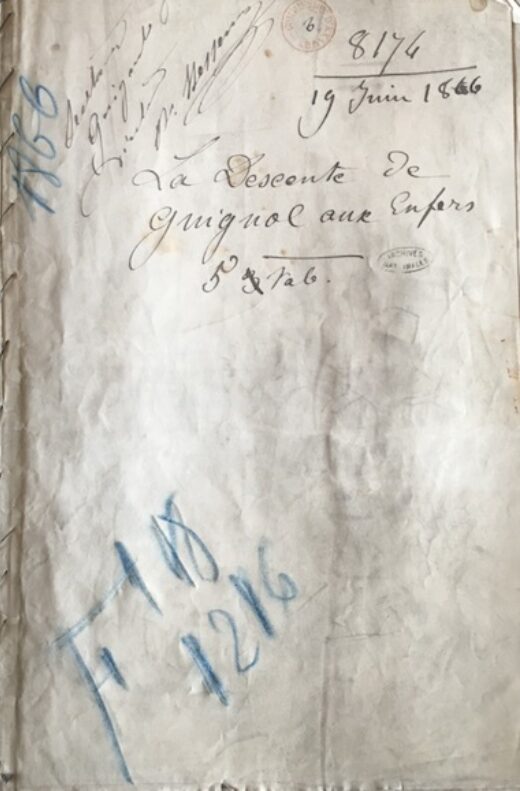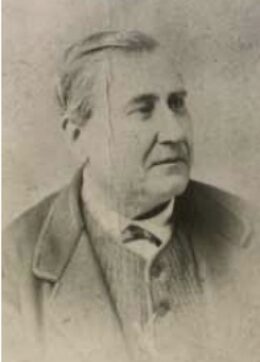
Manuscript
30 pages
Author(s)
La Descente de Guignol aux Enfers
In 1866 and 1867, Victor-Napoléon Vuillerme-Dunand and Laurent Josserand moved to Paris to perform the Guignol repertory from Lyon in a café. To do so, they had to have the manuscripts of the plays approved by censorship authorities. This collection includes thirty-five plays and is kept in the French National Archives. Most of the plays belong to the traditional repertory created by Laurent Mourguet and his successors, but it is not the case of Descente de Guignol aux Enfers, of which no manuscript is known.
The topic of the trip to the Underworld (the katabasis of classical mythology heroes) is a fairly common theme in puppet plays. Topical characters (Pluto, Proserpina, Charon, Cerberus) and geography are taken up here, but they are used in a way that twists the story into a heroicomical adventure. A matrimonial plot is added here. It takes up the story of Orpheus and Eurydice very loosely, as Guignol goes down to the underworld to bring his wife back. All these elements are presented on the farcical mode and draw on both misogynistic views on marriage and consideration of the good food which guides Guignol and his accomplices. During the last scene, the feast held by Pluto is spoiled by the flames of the underworld. At this moment, Guignol and Madelon flee on a flying dragon – a farcically spectacular ending.
A man who has lost his wife goes to the Underworld to bring her back
Guignol – Vincent’s servant – has lost his wife Madelon, who ate a melon and died of food poisoning. Vincent plans on having him marry Louison – Gnafron’s daughter – so that his two servants are bound to one another. But Guignol deeply misses his wife, with whom he was always quarreling. He leaves his master’s house with the intention of going down to the Underworld to get her back. However, Gnafron finds Guignol sitting in a wine shop. After an enjoyable meal, they go back to their master. As the marriage settlement is being drafted, Louison is delighted to have finally found a husband. She pushes Guignol in front of her with a hairpin and promises him that she will be as mean as his first wife. But Guignol manages to escape before the contract is signed: Gnafron and Louison chase after him, while Vincent decides to sit at a table to eat with his neighbour Durand.
Guignol is exhausted while looking for Madelon. He falls asleep and sees the Génie of goodness, who presents him in his dream with an image of his wife accompanied by an imp. When he wakes up, Guignol summons the Génie, who warns him about the dangers that await. He also describes the five rivers of the Underworld. But Guignol is a proud man from Lyon: he knows how to swim, and he is not scared! Before Charon lets him on his rowboat for free (Guignol promises that with such prices he will be a most loyal client), he warns the hero that Madelon is Proserpine (Proserpina)’s companion, and Proserpine might not give her back to him. Guignol insists and repeats that he is not afraid of Cerbère (Cerberus). In fact, he means to coax its seven heads with bread and cheese.
When he meets Pluton (Pluto), Guignol asks for his wife to be given back to him. The king of the Underworld remembers that the man appealing to him is protected by the Génie of goodness and thus summons his wife. Proserpine refuses to let Madelon go—she clings on to her as to her meanest companion. Then she yields, on condition that the wife consents to it. Madelon arrives, hits her husband and hurls insults at him. But Guignol provides good arguments: he has just come into an inheritance of sugar, coffee, eau de vie and absinthe… After thinking it over for a few minutes, Madelon agrees to follow him, on the flying dragon that Pluton lends Guignol to take them back up to the surface. Before they leave, the king of the Underworld promises to organise a feast for them. They are delighted about the idea, but the flames of the Underworld force them to flee before they can taste anything.
